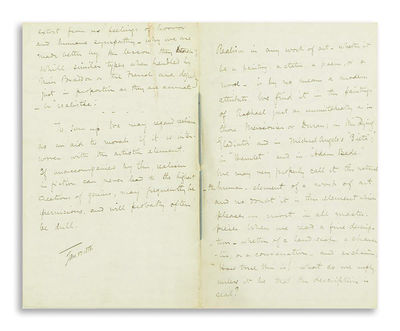first edition Manuscript
[17 January 1882?]
by RUSKIN, John
[17 January 1882?]. Manuscript. Minor staining. Near Fine. Twelve 5" x 8" pages written on 3 folded leaves, stitched together at the vertical fold, not signed but completely in Ruskin's hand. A presumably complete and untitled essay, possibly unpublished, on realism in art and its relation to morals. Ruskin begins, Realism in any work of art ... is by no means a modern attribute. We find it in the paintings of Raphael just as unmistakably as in those [of] Meissonier or Duran.... We may very properly call it the natural -- the human -- element of a work of art, and no doubt it is this element which pleases us most in all masterpieces.... But realism (truncated)









